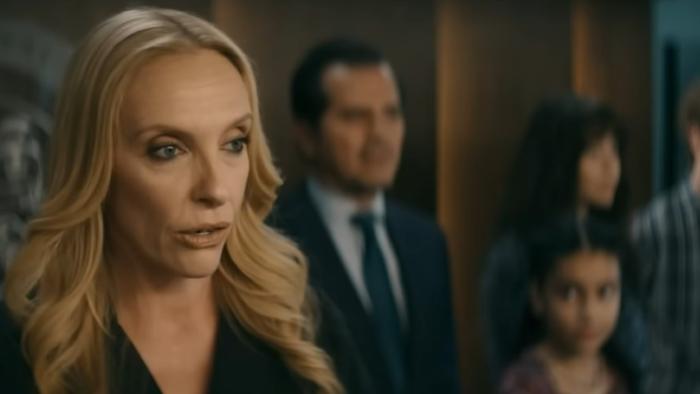By Alison Lanier | TV | April 6, 2023

The Power was a blockbuster bestseller when it arrived seven years ago, with its core concept not precisely novel but brilliantly executed. The basic premise is this: Teenage girls suddenly gain the power to control electrical energy generated within their own bodies and released to devastating and world-shaking consequences. It sounds a bit hokey — a bit X-Men-like — on the surface, but the book’s grounded realism makes the story feel less comic book and more brutally relatable. That is to say, one of the most powerless and vulnerable groups of people in the world, teenage girls in a patriarchal society, suddenly become incredibly dangerous and authoritative. A paradigm shift is underway. Societal power changes hands in a visceral and dramatic way.
And the show gets it. With an ensemble cast headlined by the wonderful Toni Collette, The Power tells a story that dots the globe, from Nigeria to Eastern Europe to London to Seattle. In London, Roxy (Ria Zmitrowicz), the hard-as-nails, unacknowledged daughter of a mob boss (Eddie Marsan), comes into her powers following a personal tragedy and uses them to upset the man-dominated order that’s keeping her confined. In Seattle, Mayor Margot Cleary-Lopez (Toni Collette) tries to get out ahead of the phenomenon, becoming the face of the disturbances as a political question, while her therapist husband, Rob (John Leguizamo), and rebellious daughter, Jos (Auli’I Cravalho, otherwise known as the voice of Moana), are both caught up in the escalating clues around the crises.
In the American Midwest, Allie (Halle Bush), a Black seventeen-year-old in an abusive foster care situation, is visited by a guiding voice (Adina Porter) in her head as she navigates the perilous and violent path toward agency, dignity, and leadership. In Moldova, the ultra-objectified trophy wife of the tyrannical president, Tatiana Moskalev (Zrinka Cvitesic), seizes the reins. And in Lagos, Tunde (Toheeb Jimoh), an aspiring journalist, breaks the story his female colleague discovered — of women coming together in secret to hone their newfound powers.
Slowly the scales shift as each of our focus characters becomes more confident and controlled in their powers, stepping forward into roles previously, implicitly forbidden to them.
This was never going to be an easy book to adapt, and it would have been easy to hit a nice gentle ground ball of a 1:1 adaptation. The book was incredibly popular; the star power of Toni Collette at the top of the bill would have drawn in viewers on its own. But the all-female team of show creators, including author Naomi Alderman herself, give it a whole-hearted treatment with smart visual storytelling and made room for the characters to feel real and emphatic rather than functionary. Halle Bush shines in a role that should rightly launch a career. And the soundtrack is objectively perfect.
That said, this show is not a full-on masterpiece of prestige TV, nor is it particularly subtle at times, but it certainly holds its own with an intelligent and emotive execution. It conjures the narrative and thematic experiences of the novel and keeps its feet on the ground with excellent acting and beats that deliver at all the right moments.
One of the show’s successes is in its communication of how bad the world sucks for women without dwelling on violence against women on screen. A brutal physical assault and murder against Roxy and her mother, for instance, is communicated without any fetishizing tendencies.
Most remarkably, its first few episodes set up a tangible sense of complex women functioning within a web of powerful misogyny. Even Margot, in a position of power, makes herself small at the “appropriate” times in order to keep the peace and get what she needs. So when the power is in their hands, the shift is tangible too on a level that is felt more than spelled out. “I didn’t realize I was operating in a constant state of fear,” says Jos. And the sense of that ordinary, functional fear-lifting is what gives the show its punch.
That said, this isn’t a simplistic rah-rah girlboss kind of feminism story. It’s a story about the complexities of what it means to have power — in this case, power that once belonged to another group. Power is never harmless, even when it feels just. This isn’t a utopia story by a long shot.
The first three episodes are available to stream on Amazon Prime with new episodes dropping every Friday.